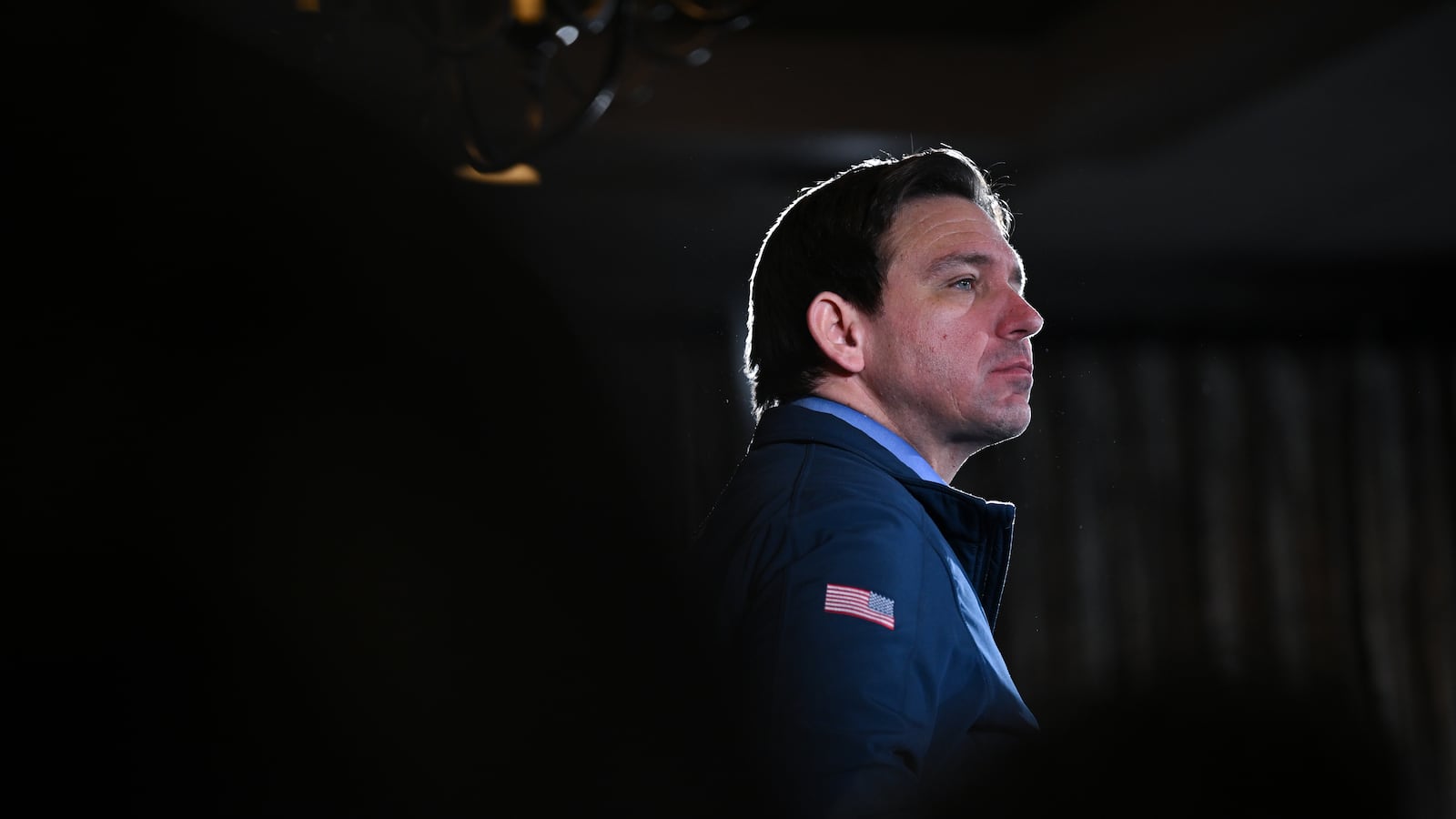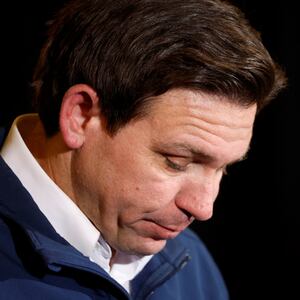In November 2022, after his blowout re-election win, Ron DeSantis stood on the precipice of history.
At the time, with other Republicans struggling and the MAGA movement’s viability in doubt, the Florida governor was hailed as something like the post-Trump future of the GOP. No one seemed better positioned to turn the page from Trump than him.
DeSantis took the leap of faith. But 15 months later, after botching his presidential campaign launch, throwing about $130 million dollars down the drain, and sustaining ruthless attacks from Trumpworld, it’s brutally clear that DeSantis was on the precipice of a different political fate: hubris.
On Sunday, two days before the New Hampshire primary, DeSantis ended his presidential campaign in a taped message he posted to X, the same social media platform where he started his campaign with a host of technical difficulties.
In the end, DeSantis' glitchy start may have actually been the pinnacle of his campaign. DeSantis never lived up to the expectations—both for himself and for his campaign full of diehards. Following a disappointing performance in the Iowa caucuses that left him with no momentum, DeSantis' campaign has been on death-watch for almost a week.
A senior Trump adviser told The Daily Beast on Thursday they thought it was “50/50” that DeSantis would drop out before New Hampshire. On Sunday, he made it official.
“If there was anything I could do to produce a favorable outcome—more campaign stops, more interviews—I would do it,” DeSantis said. “But I can't ask our supporters to volunteer their time and donate their resources if we don't have a clear path to victory. Accordingly, I am today suspending my campaign.”
DeSantis then said it was clear to him that “a majority of Republican primary voters want to give Donald Trump another chance. They watched his presidency get stymied by relentless resistance, and they see Democrats using lawfare to this day to attack him.”
And true to form, in the same breath that he endorsed Trump, DeSantis knocked the former president.
“While I’ve had disagreements with Donald Trump, such as on the coronavirus pandemic and his elevation of Anthony Fauci, Trump is superior to the current incumbent Joe Biden,” he said.
Still, Trump quickly praised DeSantis for getting behind him. The former president issued a statement to Fox News Digital saying he was "very honored" to have the governor's endorsement. "I look forward to working together with him to beat Joe Biden, who is the worst and most corrupt president in the history of our country."
In dropping out, DeSantis reserved his most stinging criticism for Nikki Haley, the last remaining major challenger to Trump. The Florida governor bitterly noted that he was the second place finisher in Iowa—an obvious shot at Haley, who has stolen most of that valor—and DeSantis said Trump had his endorsement “because we can’t go back to the old Republican guard of yesteryear, a repackaged form of warmed-over corporatism that Nikki Haley represents.”
“The days of putting Americans last, of kowtowing to large corporations, of caving to woke ideology, are over,” he continued.
As he ended his campaign, DeSantis also touted his and his campaign's work ethic. “Nobody worked harder, and we left it all out on the field,” he said, while also touting his record of “leading with conviction” and “delivering on my promises.”
But DeSantis’ record on these items when it came to his own campaign were spotty at best. His second place finish in Iowa—garnering about 23,000 votes to Trump’s 56,000—means his campaign and associated PACs ended up spending more than $5,000 for every vote he received in the presidential campaign.
Hours before the governor dropped out, NBC News published a story—complete with pictures—reporting that the chief of his allied super PAC spent hours in the final phase of the Iowa campaign working on a puzzle.
Most of all, DeSantis’ reputation for awkward and stilted voter reactions came to be a defining element of his run. He hardly ever seemed comfortable on the trail, and he seemed to hate the actual work of talking to unconvinced voters—or anyone, for that matter.
“Oh, what is that?” DeSantis asked a kid holding a frozen drink at the Wayne County Fair in Iowa over the summer. “An Icee? That’s probably a lot of sugar, huh?” The exchange went viral.
The Florida governor’s decision means the 2024 Republican primary is now a two-person race between Trump and Haley, his former United Nations Ambassador and the only remaining viable alternative to the former president.
Trump’s dominant performance in Iowa—and his strength in the post-New Hampshire primary calendar—means that this lane is likely to soon run out of road. While Haley is banking on a strong performance in New Hampshire on Tuesday, the timing of DeSantis' endorsement means that many of his supporters in the state will likely cast their votes for Trump.
But the fact that DeSantis was unable to outlast Haley, much less land virtually a single blow against Trump, reflects the yawning gap between the governor as a candidate on paper versus a candidate on the actual trail.
The discrepancy became clear almost as soon as DeSantis launched his bid, in April 2023, following months of preemptive pummeling from Trump. The governor, well known for keeping an irrepressibly online crew of advisers in his inner circle, decided to launch his campaign with an audio event on the X social media platform.
It was a disaster from the start, with the feed mired in technical difficulties and haunting audio feedback noises as almost half the initial audience of 500,000 listeners bailed on the glitchy proceedings.
As DeSantis’ woodenness on the campaign trail set in, his team sought to increasingly insulate him from any potentially unflattering interactions—sometimes militantly and to disastrous effect.
Later in the summer, The Daily Beast reported that DeSantis aides and his security detail got physical with a 15-year-old boy from New Hampshire, preventing him from asking questions on multiple occasions and trying to detain him on the sidewalk of a parade.
The same teenager, Quinn Mitchell, had previously landed DeSantis in hot water by asking a simple question about his views on the peaceful transfer of presidential power, resulting in an unwelcome viral moment for DeSantis early on in the campaign.
The DeSantis campaign never apologized to Mitchell, even as other candidates proudly engaged with him at events.
Meanwhile, the cash-flush pro-DeSantis Never Back Down super PAC—which was supposed to be the Florida governor’s “Death Star” and key advantage in taking on Trump—began to self immolate over the fall and lost many of its top leaders, as donors continued to sour on the candidate. On the campaign itself, DeSantis cycled through top staff as it became clear that he was far from seriously competing with Trump.
As DeSantis’ poll numbers stagnated and dropped, one thing remained constant: his reluctance to fully take on the former president, whose advisers reveled in “killing Ron in the cradle,” as one put it to The Daily Beast.
Meanwhile, at every turn, Trump was happy to take shots at DeSantis, testing out multiple nicknames like “Meatball Ron,” “Pudding Fingers,” and ultimately settling on “Ron DeSanctimonious.”
(At one point, after DeSantis debated California Gov. Gavin Newsom, the Trump campaign put out a statement that “Ron DeSanctimonious is acting more like a thirsty, third-rate OnlyFans wannabe model than an actual presidential candidate.”)
But despite all the embarrassments, DeSantis still came back to Trump in the end—much like Sen. Ted Cruz (R-TX) in 2016.
Shortly before the Iowa caucus, with his national support dwindling to the low teens, DeSantis finally began changing his strategy. He started to directly criticize Trump and the party apparatus that enabled him, while engaging with a media that he and his campaign had proudly antagonized and iced out just months earlier.
Standing in the snow outside his Iowa campaign headquarters just days before the caucus, DeSantis delivered one of his most forceful critiques of the former president. He lashed out at conservative media—mentioning Fox News by name—for serving as a “Praetorian guard” keeping Trump from facing harsher scrutiny. He complained about Trump’s unwillingness to show up for a debate, and never got a chance to face off with him on stage.
Trump debating “is something that’s gonna need to happen,” DeSantis said as he began to shiver on the steps, touting himself as the ideal candidate for voters who are “soft-Trump.”
“They don’t hold him accountable because they’re worried about losing viewers, and they don’t want to have the ratings go down,” DeSantis said of the conservative media outlets, many of which had treated him as the darling candidate before he entered the race. “That’s just that’s just the reality. That’s just the truth and I’m not complaining about it.”
And yet, when it came down to it, when DeSantis realized he no longer had a chance to be the nominee himself, he endorsed Trump.







